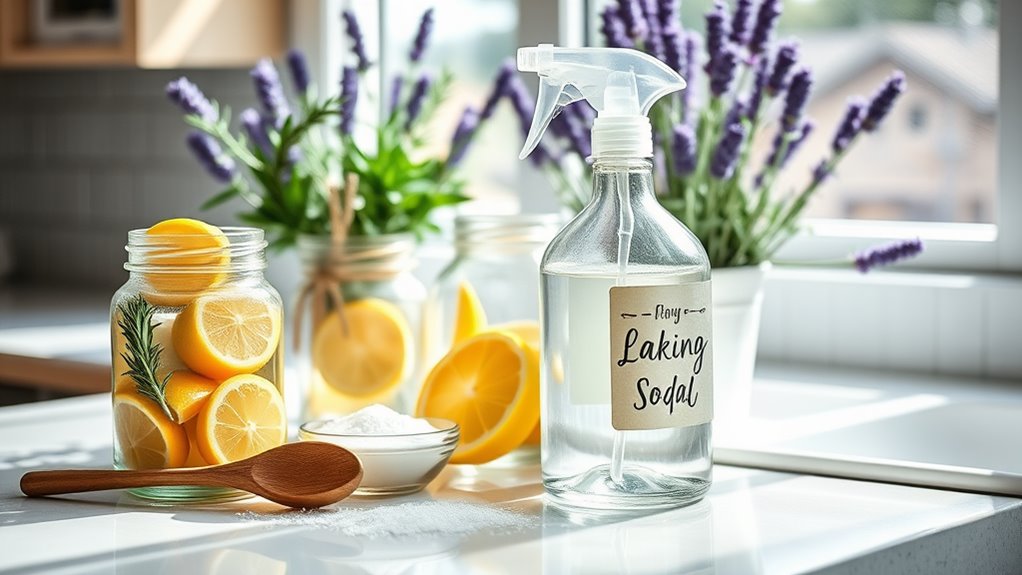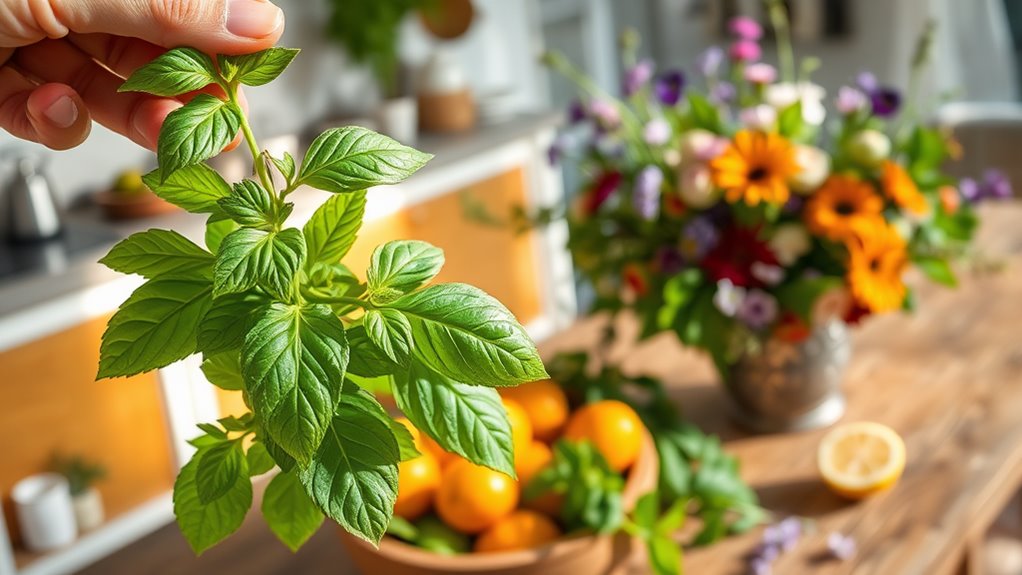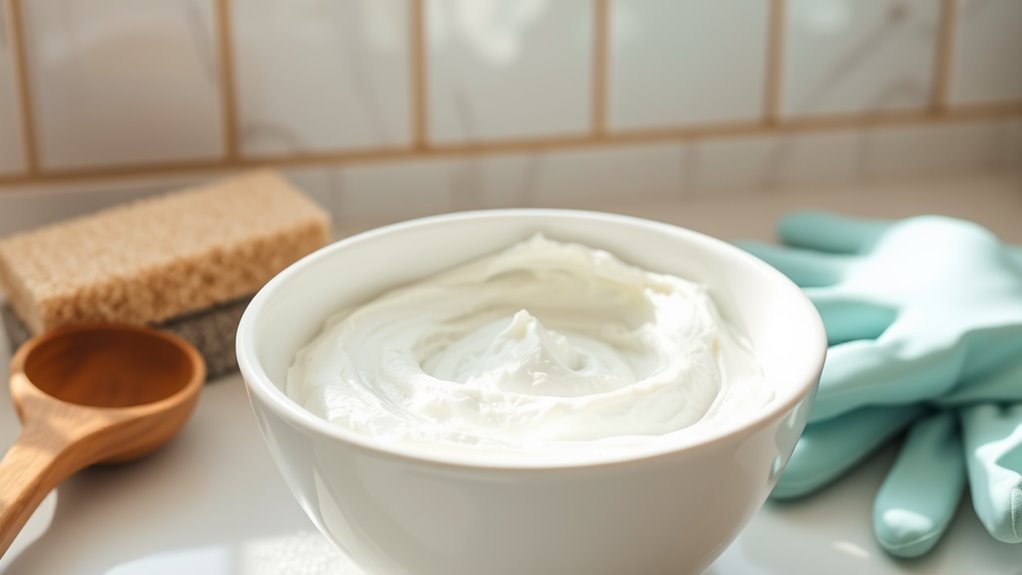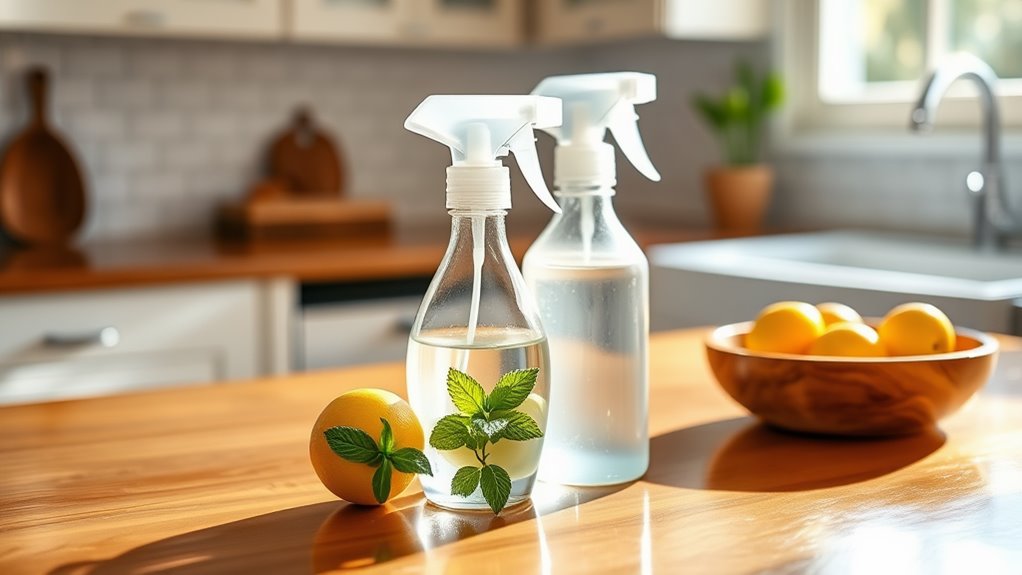DIY Cleaning Recipes That Make Your Home Smell Amazing
Want your home to smell amazing while staying clean? Try these DIY recipes! Whip up an All-Purpose Citrus Cleaner with citrus peels and vinegar for a fresh scent. For the bathroom, a Refreshing Lavender Spray neutralizes odors beautifully. In the kitchen, a Sweet Vanilla Degreaser tackles grease with a delightful aroma. Don’t forget the Invigorating Mint Glass Cleaner for streak-free shine. Each recipe is simple and effective. Discover even more ways to freshen your space!
Key Takeaways
- Create an All-Purpose Citrus Cleaner with citrus peels and vinegar for a refreshing scent while tackling grease and grime.
- Use a Cozy Peppermint Dusting Spray combining vinegar, water, and peppermint oil for effective cleaning and a refreshing aroma.
- Make a Refreshing Lavender Bathroom Spray to neutralize odors and promote a tranquil atmosphere using lavender oil and witch hazel.
- Prepare a Sweet Vanilla Kitchen Degreaser to eliminate stubborn grease while enjoying a delightful vanilla scent in your kitchen.
- Utilize a Spicy Cinnamon Carpet Freshener with baking soda and spices to eliminate odors and infuse warmth into your home.
All-Purpose Citrus Cleaner
If you’re looking for an effective and refreshing way to tackle household grime, an all-purpose citrus cleaner might just be your new best friend.
This homemade surface cleaner harnesses the power of natural ingredients, leaving your home smelling bright and invigorating. Simply combine citrus peels—like lemon or orange—with white vinegar in a jar, let it steep for a week, and then strain it into a spray bottle. The acidity of the vinegar cuts through grease and grime, while the citrus oils provide a delightful fragrance. You can use this cleaner on countertops, sinks, and even appliances, making it an ideal choice for various surfaces.
In addition, this cleaner is a great way to harness natural power and you’ll love how easy it’s to create a cleaner that’s both effective and environmentally friendly!
Refreshing Lavender Bathroom Spray
Transform your bathroom into a serene oasis with a refreshing lavender spray that not only deodorizes but also uplifts your mood.
This simple DIY recipe combines the calming scent of lavender essential oil with water and a splash of witch hazel for an effective and fragrant solution. Just mix 1 cup of water, 2 tablespoons of witch hazel, and 10 drops of lavender oil in a spray bottle. Shake well, and spritz the mixture around your bathroom to neutralize odors and create a tranquil atmosphere.
You’ll love how the soothing aroma fills the air, turning your daily routine into a relaxing experience. Plus, it’s all-natural, so you can feel good about using it in your home. Additionally, this DIY spray can help create a calming environment, making it perfect for a calming DIY essential oil mist. Enjoy your peaceful retreat!
Invigorating Mint Glass Cleaner
Say goodbye to streaky windows and hello to crystal-clear glass with this invigorating mint glass cleaner. This refreshing blend not only cleans effectively but also leaves your home smelling vibrant and alive.
To whip up your own, mix one cup of distilled water, one cup of white vinegar, and ten drops of peppermint essential oil in a spray bottle. Shake well before each use. The vinegar cuts through grime, while the mint invigorates your senses, making cleaning feel less like a chore.
Simply spray on the glass surface and wipe with a microfiber cloth for a streak-free shine. You’ll love how the crisp mint aroma fills your space, transforming your cleaning routine into a refreshing experience.
Sweet Vanilla Kitchen Degreaser
When you want to tackle stubborn grease in your kitchen, a delightful blend of sweet vanilla can make the task much more enjoyable. This homemade degreaser not only cuts through grime but also leaves your kitchen smelling heavenly. Plus, using eco-friendly ingredients ensures that your cleaning routine is safe for both your family and the environment.
Here’s what you’ll need to whip up this aromatic cleaner:
- 1 cup of water
- 1 cup of vinegar
- 2 tablespoons of dish soap
- 1 teaspoon of vanilla extract
Simply mix these ingredients in a spray bottle, shake well, and spray onto greasy surfaces. Allow it to sit for a few minutes for maximum effectiveness, then wipe clean with a cloth.
You’ll be amazed at how easily the grease disappears, and the sweet vanilla scent will brighten your day!
Uplifting Eucalyptus Floor Cleaner
As you step into a freshly cleaned space, the invigorating scent of eucalyptus can uplift your mood and energize your day. This DIY eucalyptus floor cleaner not only leaves your floors sparkling but also fills the air with a refreshing aroma.
Ingredients and Benefits
| Ingredient | Benefit |
|---|---|
| Eucalyptus Essential Oil | Uplifts mood, boosts energy |
| White Vinegar | Natural disinfectant |
| Water | Gentle on surfaces |
| Castile Soap | Cleans effectively |
To create this cleaner, mix 1 cup of water with 1 cup of white vinegar, add 10 drops of eucalyptus oil, and a few drops of castile soap. Shake well, and your floors will not only shine but smell divine! Enjoy the refreshing ambiance!
Soothing Rosemary Air Freshener
If you’re looking to freshen up your space with a calming scent, a rosemary air freshener is just what you need. You’ll only require a few simple ingredients and some easy mixing instructions to create this delightful spray. Let’s gather what you need and get started on this soothing DIY project! Plus, this homemade spray offers the benefits of essential oil room spray, making it a must-have for any home.
Ingredients You’ll Need
Creating a soothing rosemary air freshener at home requires just a few simple ingredients that can transform your space into a calming oasis.
You’ll love how easy it’s to gather everything you need to indulge your senses and refresh your environment.
Here’s a quick list of what you’ll need:
- Fresh rosemary sprigs for that aromatic touch
- Distilled water to ensure purity and effectiveness
- A splash of essential oil, like lavender or cedarwood, for added depth
- A spray bottle to mix and dispense your creation
With these elements, you’re well on your way to crafting a delightful air freshener that not only smells amazing but also promotes relaxation and tranquility throughout your home.
Simple Mixing Instructions
To whip up your soothing rosemary air freshener, you’ll find the process both enjoyable and straightforward. Start by gathering your ingredients. You’ll need a spray bottle, distilled water, and rosemary essential oil. Here’s a simple guide to get you started:
| Step | Action | Amount |
|---|---|---|
| 1 | Fill spray bottle | 1 cup of water |
| 2 | Add rosemary essential oil | 15 drops |
| 3 | Shake well | – |
| 4 | Spray around your space | – |
Just follow these easy steps, and in no time, you’ll enjoy a refreshing, calming scent wafting through your home. It’s a delightful way to elevate your environment while keeping things natural!
Zesty Lemon Disinfectant Wipes
Transform your cleaning routine with Zesty Lemon Disinfectant Wipes, a refreshing and effective way to tackle germs and messes.
These wipes not only disinfect but also infuse your space with a delightful citrus scent. You’ll love how easy they make cleaning any surface, leaving it sparkling and fresh.
Here’s what makes these wipes a must-have:
- Natural Ingredients: Harness the power of lemon’s antibacterial properties.
- Convenient: Perfect for quick clean-ups in any room.
- Versatile Use: Ideal for kitchens, bathrooms, and high-touch areas.
- Eco-Friendly: A sustainable alternative to chemical-laden products.
Embrace a cleaner, fresher home with these zesty wipes that make disinfecting a breeze!
Earthy Tea Tree Oil Surface Spray
After refreshing your space with the Zesty Lemon Disinfectant Wipes, you might want to explore another powerhouse in natural cleaning: the Earthy Tea Tree Oil Surface Spray. This versatile spray not only disinfects but also leaves behind a lovely, earthy aroma. It’s perfect for countertops, tables, and even bathroom surfaces.
Here’s how to whip it up:
| Ingredient | Amount | Purpose |
|---|---|---|
| Tea Tree Oil | 10 drops | Antimicrobial properties |
| Distilled Water | 1 cup | Base for the spray |
| White Vinegar | 1/2 cup | Natural deodorizer |
Simply mix these ingredients in a spray bottle, shake well, and enjoy a fresh, clean home that smells fantastic!
Spicy Cinnamon Carpet Freshener
If you’re looking to refresh your carpets and add a warm, inviting scent to your home, the Spicy Cinnamon Carpet Freshener is just what you need.
This simple recipe combines natural ingredients that not only eliminate odors but also infuse your space with a delightful aroma. Here’s what you’ll need:
- 1 cup baking soda
- 2 tablespoons ground cinnamon
- 1 teaspoon ground ginger
- 1 teaspoon ground cloves
Mix these ingredients in a bowl, then sprinkle the mixture generously over your carpets.
Let it sit for at least 15 minutes to absorb odors, then vacuum thoroughly.
You’ll be amazed at how this easy DIY freshener transforms your home into a cozy haven filled with the warm scent of spices!
Floral Rose Petal Room Spray
Creating your own Floral Rose Petal Room Spray is a delightful way to freshen up your space with a touch of elegance. You’ll need just a few simple ingredients, and I’ll share some handy application tips to make the process effortless. Let’s transform your home into a fragrant oasis!
Ingredients You’ll Need
To whip up a delightful Floral Rose Petal Room Spray, you’ll need a few simple yet fragrant ingredients that will transform your space into a serene oasis.
Gather these essentials to create an enchanting aroma:
- Fresh rose petals for that authentic floral scent
- Distilled water to keep your spray pure and gentle
- Vodka or rubbing alcohol to act as a natural preservative
- A few drops of essential oil, like lavender or geranium, for added depth
With these ingredients in hand, you’re ready to craft a refreshing room spray that not only smells divine but also elevates your mood.
Embrace the soothing essence of roses, and let your home bask in their calming fragrance.
Happy creating!
Application Tips & Tricks
Once you’ve crafted your Floral Rose Petal Room Spray, applying it effectively can enhance its soothing effects.
Start by shaking the bottle gently before each use to mix the ingredients well. For maximum scent diffusion, spritz your room spray in the corners of the room, allowing the fragrance to envelop the space.
Target areas with stale odors, like near trash cans or laundry hampers. You can even spritz your linens or curtains for a long-lasting, subtle aroma.
Remember to keep the spray away from direct sunlight, as it can cause fading.
Lastly, consider using it before guests arrive; a fresh, floral scent instantly creates a welcoming atmosphere.
Enjoy your beautifully fragrant home!
Cozy Peppermint Dusting Spray
A cozy peppermint dusting spray not only freshens up your home but also adds a delightful holiday scent that lifts your spirits.
It’s simple to make and incredibly effective. You’ll love how it transforms your cleaning routine!
Here’s what you’ll need:
- 1 cup of water
- 1 cup of white vinegar
- 10-15 drops of peppermint essential oil
- A spray bottle
To create your spray, mix the water and vinegar in the bottle, then add the peppermint oil.
Shake well before each use.
This dusting spray not only cleans surfaces but also leaves a refreshing aroma that makes your home feel warm and inviting.
Enjoy the cheerful ambiance as you clean, making your space a perfect sanctuary for the holidays!




